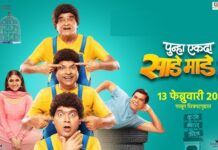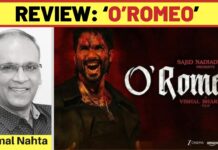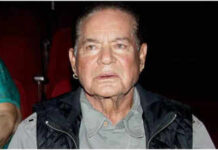By Surendra Bhatia
Bollywood’s Election Lessons For Politicians
Elections are done and dusted. Spread over 50-odd noisy days and in campaign mode for more than four months, the general elections of the world’s largest democracy got decided within five quick hours on the morning of May 23. The ruling party and government was voted back in; some states saw upheavals but the larger question of governance from Delhi for the next five years was settled. Modi shall continue… abki baar, it’s for sure Modi sarkaar.
Politics and cinema in India have an intimate connection. Both bank on sending out messages to the masses and when they do it convincingly, they come out smelling roses; if they don’t do a good job of it, they topple into a pit from which coming back is not so easy. Essentially, both, politics and films, are exercises in communication. A film starts with a premise which it then spends 120-150 minutes to sell to audiences; politicians do much the same, at least the selling part.
In this particular election, political parties peddled various messages. The BJP, for instance, tried to sell Modi as a strong leader who could protect the country. The Congress, and particularly Rahul Gandhi, spent all its time saying that Modi was a corrupt good-for-nothing guy who didn’t have the courage to even look him in the eye. The election result could not have been anything but what it was.
Had Congressmen hired a Bollywood publicist to help out in the elections, he would have advised them to instantly dump this campaign idea. He would have told them in no uncertain terms that any film showing Amitabh Bachchan being scared of Tusshar Kapoor, and so intimidated by him that he couldn’t even look him in the eye, was a non-starter, a miserable failure at the very scripting stage. No public would buy it, and in Bollywood, probably not even Tusshar. It is quite possible that within the Congress Party, Rahul Gandhi is the Supremo and no one dare look him in the eye, and it might be possible to sell that to the public but to script that Modi, a strongman prime minister, was shying away in fear when Rahul turned his eye on him, was never saleable. As any film person would have known, the confrontation between Tusshar Kapoor and Amitabh Bachchan… sorry, Rahul and Modi, had to meet just one highly predictable end.
It’s a matter of getting the optics right, the film publicist would have advised the Congress. Modi could have been targeted by Rahul Gandhi as being misguided, as out of his league, as stubborn and dogmatic, as a person who didn’t understand economics, or international relations, or as the Hindu hardliner who would start an unwinnable nuclear war with Pakistan or China… but to show Modi, the man who had started life as a chaiwala’s son and had risen by dint of hard work to become the prime minister of the country, as weak and cowardly, and scared of Rahul Gandhi, was just not digestible, as the Congress has now found out. A film writer could have so easily set the Congress straight on this simple issue by staying away from this ‘can’t look in the eye’ business.
If a film writer or director had been involved in the Congress campaign, maybe the party would not have sent out so many mixed messages. Film writers and directors, at least the good ones, keep their messaging clear and so transparent that even a kid can decipher it easily. It is burnt into heart and soul of Hindi film writers that the premise of the film needs to be laid out for the public within the first ten minutes of the film. And the film narrative that follows has to justify the premise, make it come true credibly. There is no other sensible way film scripts are handled. A good film writer would not have let the Congress spell out so many messages to the public: Chowkidar chor hai; Modi is scared of Rahul; Modi is damaging respected national institutions; Modi is killing federalism; Modi is bringing Hindu Rashtra, and Muslims are doomed in his raj; etc. Also thrown in the mix was endorsement of the tukde tukde gang, Modi’s ‘ineffective’ Pakistan policy, doubting of Balakot strikes, corruption charges against Modi with Rs. 30,000 crore going into A. Ambani’s pocket and so much more. Any talented film writer would have advised the Congress to stick to one theme, Chowkidar chor hai, or fear that Modi would destroy India in trying to destroy Pakistan. And then, it could have built slowly on that foundation to make the charges seem credible. That’s how successful films are written; a hodge-podge of ideas in one single film (or election) invariably creates editing problems and ends up being too muddled to be convincing, with no chance of working with audiences.
Here, the case of Sunny Deol’s election campaign makes a good illustration. Sunny Deol (though bearded, was funnily referred to as Sunny Leone by a TV anchor, but that is a side story) kept his campaign short, sweet and simple. Astonishingly, Sunny actually told his audiences that he was a newcomer in politics and knew nothing about political issues but he loved them (the people) and asked them to vote for him! When political journalists tried to question him on specifics, he pleaded ignorance… even on an important issue like the Balakot attacks, he said, he didn’t know enough about it to comment, and he got away with it. Sunny Deol gave general speeches about how much he loved his new constituency, Gurdaspur, and he loved the people living in it and how he would do all he could to help them as their MP… and you know what? He defeated a heavyweight Congress leader and emerged triumphantly as the Gurdaspur member of parliament! All Sunny did was to break into Punjabi occasionally, and don a turban to look nice as a Sardar and kept repeating that he didn’t know anything but he loved them all… that’s the script a film writer must have written for him: uncomplicated, self-effacing and entirely credible in the northern belt of Punjabis and Sardars! If a political writer had been writing his speeches, Sunny would have tied himself in knots and failed miserably, as it has happened to the Congress Party.
In that sense, maybe the BJP and Modi had the right ideas when they wooed and kept close at hand ace Hindi film writer and lyricist Prasoon Joshi, who is also an ad guru. The exact role Prasoon played in the BJP campaign is not publicly known but it seems clear that he was involved to a certain degree, especially in its promotional films. The BJP campaign does seem to suggest that a film writer had probably advised it to keep the message straight and simple, exactly the way a film writer conceives a hit film. The BJP’s message was just one and it was uncomplicated, straight to the point and easy for the public to digest: Modi is a strong man who can be trusted with the country. And, subsequently, the campaign built on how the strong man would serve the country best. These were sub-plots elaborating the basic single point: Modi is the right man for the PM’s job. And it worked fabulously.
All successful films follow this one-line agenda. For instance, in Dangal, it is established instantly that Aamir Khan’s character wants a son to win a gold medal for the country. But his wife delivers only daughters. So, he decides that, if not his son, his daughter would win the gold medal that he was so desperate to get. Straightforward and uncomplicated… Then the narrative builds on the various sub-plots to turn it into a feature film, but it never dilutes the original premise: the child must win the gold medal for Aamir.
It might seem like hindsight but the fact is that the Congress muddled its many messages and confused the electorate; BJP kept it simple and connected with the aam aadmi. The difference, as is usually the case in films, was in the scripting.
Politicians generally look down upon films and film technicians, and refuse to take anyone seriously except maybe film stars but only for their ability to attract crowds. Yet, the smarter politicians know that film writers and directors are a great help in communicating with the masses. This was seen explicitly in Hollywood film Wag The Dog, made a couple of decades back. In this film, the US President’s troubleshooter (Robert De Niro) hires a reputed Hollywood producer (Dustin Hoffman) to help the President get re-elected. The filmmaker spins a web of deceit through ad films and short films to create war hysteria and successfully projects the incumbent President as the man of the hour, the only one who can lead the country through the crisis. And, no guesses required here – the President gets re-elected!
Of course, Wag The Dog was just a film but the relationship between US presidential campaigns and professional media managers and filmmakers is not uncommon. In India, it is less so, possibly because politicians see themselves as far above filmmakers in the social hierarchy and often feel, they know how to communicate with their subjects. But professional inputs do help, as seen in Wag The Dog.
As the world gets smaller and the people intensely web-connected, it is quite possible that film writers and makers will be taken on board all political campaigns in India. It just can’t be otherwise. In politics, the message and purpose of communication may change but the domain expertise is only with the masters of mass communications. Just as a good film manipulates emotions of its audience, political communicators in the near future will use similar devices to influence perceptions of voters.
Is it desirable? It is easy to say that the media must not be used to manipulate voters and alter people’s perceptions to get them to vote for the wrong guy. But the world is not as simple as that. This ‘manipulation’ and using media to ‘influence’ people has always been around, and is never going to go away. For instance, the entire advertising industry, not just its films, is constantly at work to influence the people to buy stuff for various reasons. The ad industry makes products desirable to the masses, and uses all methods right and wrong, to influence people to buy. Today, college girls are made to feel inadequate if they don’t have the ‘right’ lipstick or shoes or dresses… housewives suffer from low self-esteem if they can’t afford the ‘right’ white goods in their kitchen… and guys hate the idea of driving their small car when ads of luxury cars flash on the screen. This kind of influencing works. The same will now be done for politicians.
































